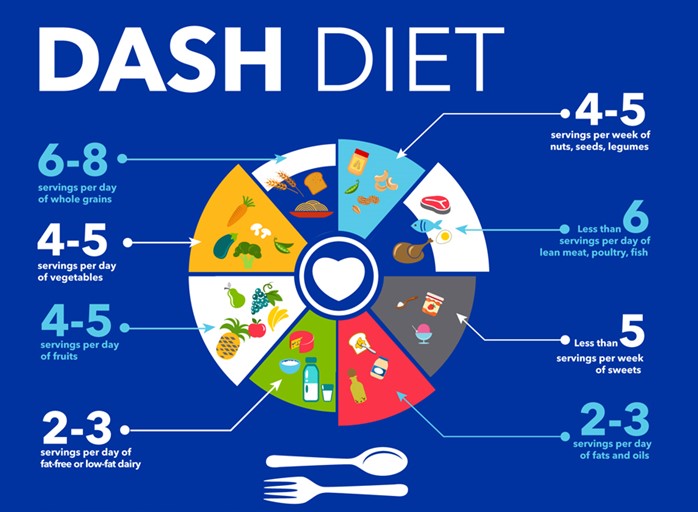A nurse is providing teaching about the Dietary Approaches to Stop Hypertension (DASH) diet to a client who has hypertension. Which of the following instructions should the nurse include?
Consume ten percent of total calories from saturated fat.
Consume foods that are high in calcium.
Increase intake of refined carbohydrates.
Limit sodium intake to 3,200 milligrams per day.
The Correct Answer is B
Choice A reason: Consuming ten percent of total calories from saturated fat is not a part of the DASH diet because it is too high for most adults. The DASH diet recommends consuming less than seven percent of total calories from saturated fat, which translates to about 16 g of saturated fat per day for an average adult who consumes 2,000 calories per day.
Choice B reason: Consuming foods that are high in calcium is a part of the DASH diet because it can help lower blood pressure by relaxing the blood vessels and reducing the force of contraction of the heart. The DASH diet recommends consuming 1,000 to 1,200 mg of calcium per day, which can be obtained from dairy products, leafy greens, beans, nuts, and fortified foods.
Choice C reason: Increasing intake of refined carbohydrates is not a part of the DASH diet because it can raise blood sugar and insulin levels, which can increase blood pressure and damage the blood vessels. The DASH diet recommends consuming 45 to 55 percent of total calories from carbohydrates, but mostly from whole grains, fruits, and vegetables, which are rich in fiber and antioxidants.
Choice D reason: Limiting sodium intake to 3,200 milligrams per day is not a part of the DASH diet because it is too high for most adults. The DASH diet recommends limiting sodium intake to 2,300 milligrams per day or less, which can help lower blood pressure by reducing fluid retention and vascular resistance.

Nursing Test Bank
Naxlex Comprehensive Predictor Exams
Related Questions
Correct Answer is B
Explanation
Choice A reason: Dietary restrictions will not eventually allow the intake of gluten to resume. Gluten is a protein found in wheat, barley, rye, and some oats. It causes damage to the small intestine in people with celiac disease. The only treatment for celiac disease is a lifelong gluten-free diet.
Choice B reason: This condition may cause secondary lactose intolerance. Lactose is a sugar found in milk and dairy products. It is broken down by an enzyme called lactase in the small intestine. People with celiac disease may have reduced levels of lactase due to the damage to the small intestine caused by gluten. This can lead to lactose intolerance, which is the inability to digest lactose properly. Symptoms of lactose intolerance include bloating, gas, diarrhea, and abdominal pain after consuming dairy products.
Choice C reason: Nutritional therapy for this condition does not include limiting proteins and calories. People with celiac disease need adequate amounts of proteins and calories to maintain their health and prevent malnutrition. They also need to ensure that they get enough vitamins, minerals, and fiber from gluten-free sources.
Choice D reason: A normal diet cannot resume after a period of remission. Celiac disease is a chronic autoimmune disorder that does not have a cure. Even if the symptoms improve or disappear, the damage to the small intestine can still occur if gluten is consumed. Therefore, a strict gluten-free diet must be followed for life.
Correct Answer is C
Explanation
Choice A reason: 1/2 cup cooked broccoli contains about 2.6 grams of fiber, which is moderate compared to other foods. Broccoli is also a good source of vitamin C, folate, and antioxidants.
Choice B reason: 1 slice whole wheat bread contains about 2 grams of fiber, which is low compared to other foods. Whole wheat bread is also a good source of carbohydrates, B vitamins, and magnesium.
Choice C reason: 1 medium apple with peel contains about 4.4 grams of fiber, which is high compared to other foods. Apple is also a good source of vitamin C, potassium, and phytochemicals.
Choice D reason: 1/2 cup corn flakes with skim milk contains about 0.5 grams of fiber, which is very low compared to other foods. Corn flakes are also high in sugar and low in nutrients, while skim milk is a good source of protein and calcium.
Whether you are a student looking to ace your exams or a practicing nurse seeking to enhance your expertise , our nursing education contents will empower you with the confidence and competence to make a difference in the lives of patients and become a respected leader in the healthcare field.
Visit Naxlex, invest in your future and unlock endless possibilities with our unparalleled nursing education contents today
Report Wrong Answer on the Current Question
Do you disagree with the answer? If yes, what is your expected answer? Explain.
Kindly be descriptive with the issue you are facing.
